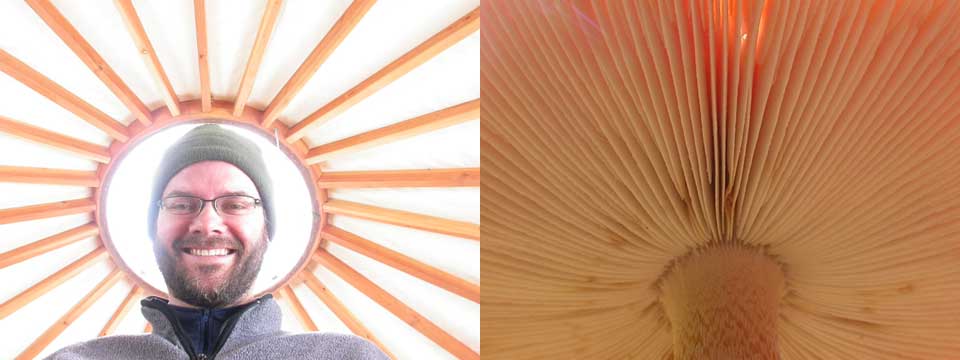That is me, Jonathan…channeling my inner mushroom by posing in front of a yurt skylight. Here are answers to FAQs about my job:
Q: How much do you teach? A: It depends. I have a 50% teaching/50% research appointment, at present, but the appointments will change in 2018 when I assume the role as Director of the Itasca Biological Station & Laboratories in northern MN. The time I spend on these roles changes constantly. Most people visualize a professor in the classroom, but my job is at an interface of teaching and research. I teach two courses, at present, and I rotate teaching other courses. The research is a big deal, however, and it keeps my teaching at the cutting edge. That is a key benefit to undergraduate students who take advantage of research opportunities. I also train graduate students and postdocs, a constant role with no credit hours. My job is like doing improv while driving a bus – there is no formula, but a crowd is along for the ride. Pretty soon, I'll change that metaphor to suit Itasca...perhaps driving a Voyageur canoe.
Q: How do you pay for research? A: Grants and contracts. I compete, usually with collaborative teams, for grants from the National Science Foundation (NSF), Department of Agriculture (USDA), and Department of Energy (DOE), along with other sources, some State- or University-level initiatives such as MnDRIVE. For externally-sponsored grants, the University takes a cut at a negotiated indirect cost recovery rate. I use the remainder to pay salaries, supplies, equipment, and travel. My annual operating costs are similar to those of a small business, and you may be surprised how much research costs.
Q: Were you trained for the complexities? A: No. No scientist is, but you learn as you go, and you trust the system. The U.S. has long been at the forefront of innovation, in part because of our grants system and commitment to funding science that is basic in nature. Tax dollars are allocated to agencies who identify areas for investment with the help of scientists. Our best and most experienced scientists can apply a broader perspective and help guide this process. We compete for those funds, do the research, train students, and share findings through a filter of peer review. This way, there is a system to allocate research where we need it, even if we, as individuals, do not understand the details of every project. It is a good system, as long as we trust it and avoid having/using politics to undermine it.
Q: Do you have summers off? A: No. I have a 9-month appointment, but during summers, I can be paid from grants to do research. I have done that every summer for 10 years, so I have had 2 weeks off every summer. That said, some of my summer work has been in cool places like Alaska, New Zealand, and Costa Rica. Soon, my job will include 2 summer months up north at Itasca, to work in the old growth and wilderness I love, dearly.
Q: Why did you become a mycologist? A: Fungi drive global nutrient cycles, they are a frontier in terms of research, and they are ‘microbes’ that I can identify from a moving vehicle (i.e. large & charismatic). Plus, many taste great in butter and garlic. Why study anything else?
